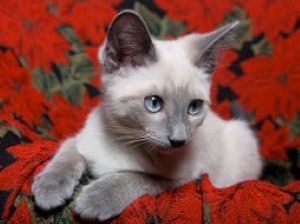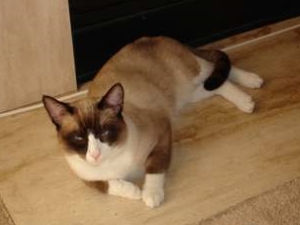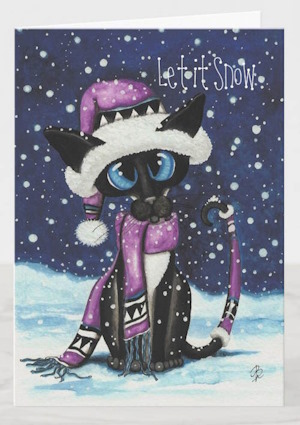Constipation in Cats
What can you do about constipation in cats? How much do you know about it? What causes it, what are the signs and symptoms, the veterinary remedies, and are there any home treatments you can use?
Let's take a look.
First, What Exactly Is Cat Constipation?
The veterinary description of feline constipation is 'absent, infrequent, painful defecation'. A cat is constipated when their stools are too hard to pass, causing a build-up of the feces in the bowel.
You might notice that your pet hasn't used his litter tray for a few days, or only uses it once in a while, or not at all. In general, most cats 'go' once a day, or perhaps once every two days.
Because cats are predominantly meat eaters and don't get a lot of fiber in their diets, their stools tend to be a lot more solid than human ones, so hard stools aren't necessarily a sign of constipation in cats, as long as they're appearing every day or so.
A breeder once told me that keeping an eye on your cat's litter tray and bowel habits was one of the most useful things you could do to keep them healthy – she said you can tell a lot from cat poo!
She was English. I guess that's 'poop', for our American visitors. In a constipated cat there will be a noticeable lack of poo. (Or poop).
Signs and Symptoms of Constipation in Cats
As well as an absence of feces, you might notice that your cat uses his litter tray to pass stools only once every few days, or struggles and strains when he does (even, sometimes, crying out) or that there's blood or mucus in the stools.
Other things you might notice are that your cat washes his bottom extensively and frequently, or that he scoots his rear end along the floor.
All of these are signs of constipated cats. Why is this, and what can you do about it?
Causes of Constipation in Cats
It's sometimes quite difficult to work out what's causing the problem, as there are a few things that can cause constipation in a cat. The main ones are:
Changes in Environment
A new cat in the house, a change in the location of a litter tray, dirty litter or a change in diet can cause stress, stopping your feline friends from using their litter trays, in turn leading to constipation.
You'll need to be a bit of a cat detective if you suspect environmental causes, and try to figure out just what it is that your cat's objecting to.
Obstructions of the Large Intestine and Bowel
Constipation can be caused by obstructions in the bowel.
These can include hairballs, impacted or infected anal glands, inflammatory bowel disease, polyps or small tumors in the bowel, or injury – if a cat has ever been in an accident, damaged nerves and muscles or a fractured pelvis can cause obstruction.
Obesity
Too many pounds or kilos can also put additional strain on the bowel, and some overweight cats can be prone to constipation. Get dietary advice on slimming them down if yours are overweight.
Treatments and Remedies for Constipation in Cats
The first and most important piece of advice is to have your pet checked out by a veterinarian if you suspect anything at all serious.
A high-fiber diet can help, and you can now buy specially formulated cat foods for constipation. Light, senior and hairball foods all contain additional fiber.
Home treatments, such as adding a pinch of fiber to your cat's food can help – ground flax seeds can be useful but don't use whole seeds as these can make the problem worse. A teaspoon of canned pumpkin added to a meal may also be helpful.
You can also try adding 1/3 teaspoon of olive oil to your cat's evening meal, which will help make the stools easier to pass.
A veterinarian will also be able to prescribe laxatives if necessary – these are particularly helpful for long-haired cats prone to hairballs, which pass through to the intestine and become lodged there, causing a blockage.
Exercise Can Be Helpful, Too
Exercise helps keep things moving (in more ways than one!)
If your cat's a bit of a couch potato, build in some daily dedicated playtime to get your cat moving. Jumping, twisting and running around can all help, so invest in some cat toys and play along.
Related Pages
Some of the articles and newsletters on this site may contain links to products I think you may enjoy. If
you purchase through these links I receive a small commission, but there's
no extra cost to you. Find out more on the Affiliates Disclosure page.
Have You Discovered Our Newsletter?
If not, why not? Subscribe to our email newsletter, Meezer Musings, to stay in touch, be the first to see new information and pages as they come out, and read the things we only talk about in the newsletter.
Learn more about it on our Newsletter Sign-Up page.




